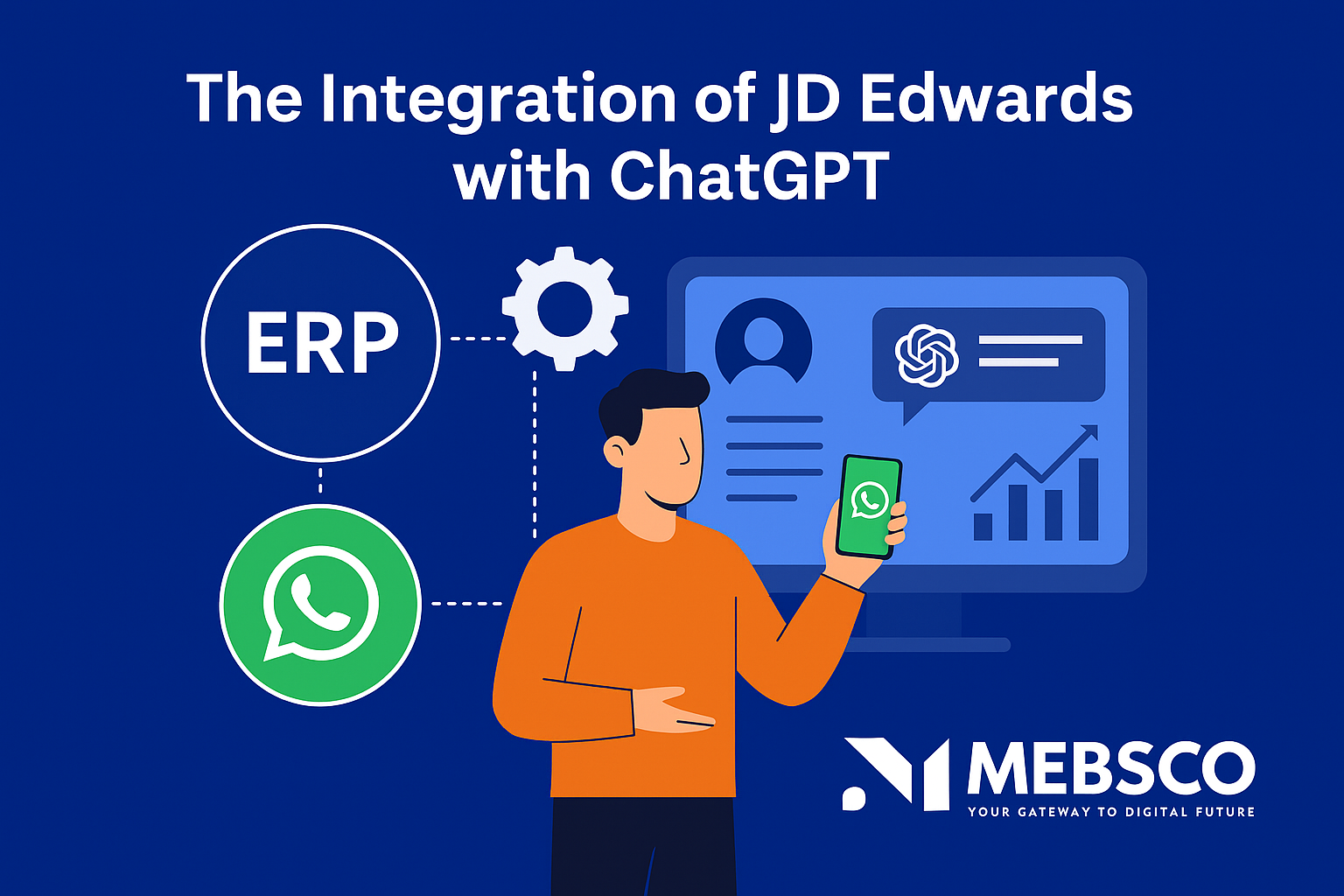MEBSCO Blog
Welcome to the MEBSCO Blog! Here, we bring you a wealth of insights and expertise on ERP solutions, digital transformation, and innovative strategies to help your business thrive in an increasingly competitive landscape.
At MEBSCO, we’re passionate about supporting businesses across diverse sectors, including healthcare, retail, education, and manufacturing. Whether you’re interested in enhancing your operations with Oracle JD Edwards, improving decision-making with Oracle NetSuite, or streamlining processes through ERPNext and Odoo, our blog is designed to be a practical guide. Each post is crafted to offer valuable knowledge on everything from software selection and implementation to best practices in ERP customization and ongoing management.
Our blog goes beyond technical guidance—it’s about helping you understand the evolving ERP ecosystem, navigate complex challenges, and seize new growth opportunities. We’ll keep you informed on the latest industry trends, share success stories from real-world implementations, and dive deep into practical advice for optimizing workflows and achieving long-term business value.
Thank you for joining us on the MEBSCO blog. We’re here to empower your organization’s journey toward operational excellence, efficiency, and sustainable growth. Explore our posts, discover fresh perspectives, and let’s grow your business together!
Driving Growth with Cloud ERP in the Middle East
Introduction In today’s fast-changing business world, one thing is becoming very clear — technology and ERP is no longer optional for growth, especially in the Middle East. Whether you’re running a small manufacturing company in 10th of Ramadan City, managing a retail chain in Cairo, or expanding your services across the Gulf, the difference between businesses that grow and those that struggle often comes down to one question: how well do you manage your operations, data, and decisions? That’s where ERP (Enterprise Resource Planning) systems come in — and more specifically, Cloud ERP. For many companies in Egypt and the Middle East, the move to cloud-based ERP isn’t just about going digital; it’s about unlocking a new level of efficiency, insight, and scalability. Over the past few years, the region has been witnessing a massive digital transformation. Governments are pushing for modernization, new startups are emerging with tech-first mindsets, and even traditional industries are realizing that spreadsheets and disconnected software are no longer enough. Yet, despite this shift, many business owners still find themselves asking the same questions: “Is Cloud ERP really safe and reliable for my business?” “Can it handle Egyptian regulations and Arabic language support?” “Will it actually reduce my costs or just add another expense?” “What’s the difference between all these systems — NetSuite, ERPNext, SAP, Odoo — and which one fits me best?” These are valid concerns — and...
Ultimate Signs You Need ERP, Not Obsolete, Costly Sheets
Pain points of spreadsheets For decades, spreadsheets have been the go-to tool for businesses of all sizes. They’re easy to set up, relatively inexpensive, and familiar to almost everyone in the workforce. Many companies still use spreadsheets instead of ERP to manage everything from accounting to sales forecasts, project tracking, supply chain operations, and even HR data. In the early stages of a business, this makes sense—spreadsheets provide a quick, low-barrier way to organize information and perform calculations. However, as businesses grow, spreadsheets begin to reveal their limitations. What once seemed like a simple and flexible tool can gradually turn into a bottleneck, slowing down operations, creating risks, and costing the company far more than expected in terms of time, money, and missed opportunities. Below, we’ll break down the main pain points of relying on spreadsheets and why they often hold back growing organizations. 1. Data Entry Errors and Human Mistakes The most obvious weakness of spreadsheets is that they rely heavily on manual data entry. No matter how careful employees are, errors are inevitable. A misplaced decimal, an extra zero, or a wrong formula can completely distort financial reports, forecasts, or inventory numbers. Industry studies consistently show that more than 80% of spreadsheets contain some form of error. In a small business, these errors might not cause significant damage. But as the complexity and size of your data grows, the...
ERP Education: The Ultimate Integration Key
What Is the Education Module in ERP Systems? The education module in ERP (Enterprise Resource Planning) systems is a specialized component designed to meet the unique needs of educational institutions. It serves as the digital backbone of academic operations, enabling schools, colleges, and universities to manage a wide range of administrative and academic tasks through one centralized system. Unlike traditional ERP modules that focus on areas like finance, human resources, or inventory, the education module is tailored specifically to streamline processes in teaching, learning, and student lifecycle management. At its core, the education module automates and integrates functions related to academic planning, course scheduling, attendance tracking, examination management, and student performance monitoring. By consolidating these functions, it eliminates redundant manual tasks, reduces the risk of errors, and provides school administrators and teachers with real-time access to critical information. Key Features of the Education ModuleA robust education module typically includes the following key features: Student Information Management: This is the foundation of the module, storing detailed records for each student including personal information, enrollment status, academic history, and behavioral reports. With this feature, schools can easily manage admissions, class assignments, transfers, and graduations. Curriculum and Timetable Management: The education module allows...

Inventory vs. Warehouse: Smart Insights for Better ERP
Definition of Inventory vs. Warehouse In business operations, the terms “inventory” and “warehouse” are often used interchangeably, but they represent two distinct concepts with unique roles. Understanding the definitions of inventory and warehouse is the first step to managing business resources more effectively and improving operational efficiency. Inventory refers to the total amount of goods and materials that a business holds for the purpose of resale, production, or utilization in business activities. It encompasses all the items a company keeps track of, including raw materials, work-in-progress (WIP) items, and finished products ready for sale. Inventory can be physical—tangible goods stored in various locations—or it can include intangible items like digital products, depending on the nature of the business. In simple terms, inventory represents the “what” in a business’s stock management system: what products or materials are available, how many units are on hand, and where they are within the supply chain. Inventory can also be categorized into different types based on its purpose, such as safety stock, cycle stock, seasonal inventory, or excess/obsolete stock. Accurate inventory management is crucial to ensure a business can meet demand, avoid overstocking, and minimize carrying costs. In contrast, a warehouse refers to the physical facility or location where inventory is stored, managed, and processed before being distributed to customers or production lines....
Why ERP Fundamentals Should Be Part of the NextGen Education
Introduction to ERP Systems Enterprise Resource Planning (ERP) systems are integrated platforms that organizations use to manage and streamline their core business processes, such as finance, human resources, supply chain, procurement, and customer relations. These systems unify different departments and functions onto a single computer system that serves the needs of various units, enhancing efficiency and accuracy across the board. In today’s business environment, characterized by rapid globalization and digital transformation, ERP systems play a pivotal role. They enable businesses to respond quickly to market demands, improve customer service, and achieve operational excellence. Organizations that leverage ERP systems gain real-time insights into their operations, allowing for better decision-making and strategic planning. As the world becomes increasingly interconnected, understanding ERP systems is not just an IT concern—it’s a business imperative. Whether in multinational corporations or small startups, ERP systems are essential tools for managing growth, reducing costs, and maintaining competitive advantage. Yet, despite their significance, ERP concepts are often absent from traditional educational curricula, leaving a critical knowledge gap in the workforce. Educating the next generation about ERP systems means preparing them for the realities of modern workplaces. By introducing ERP fundamentals early, students can grasp how various business functions interrelate,...

JD Edwards the amazing Integration with the ChatGPT
Introduction to JD Edwards and ChatGPT Integration In today’s fast-paced business environment, enterprises must adapt to rapidly evolving technology to maintain their competitive edge. Two powerful tools, JD Edwards (JDE) and ChatGPT, have emerged as game-changers in their respective domains, offering innovative solutions to enhance operational efficiency and user experience. By integrating these two technologies, businesses can unlock new levels of functionality and efficiency, enabling seamless collaboration between human and machineز JD Edwards: A Robust ERP System JD Edwards, developed by Oracle, is a leading enterprise resource planning (ERP) solution designed to streamline and manage various business processes. Known for its versatility and scalability, JDE offers comprehensive functionality across key business areas, including finance, supply chain management, manufacturing, human resources, and customer relationship management. With its modular architecture and ability to adapt to diverse industries, JD Edwards empowers organizations to customize workflows, automate tasks, and make data-driven decisions. Its robust Orchestrator tool further enhances its capabilities by facilitating integration with external systems, allowing businesses to extend the system’s functionality to suit their specific needs. ChatGPT: An AI-Driven Conversational Assistant ChatGPT, developed by OpenAI, is a sophisticated artificial intelligence tool that leverages natural language processing...
Trends, Challenges, and Opportunities of The Artificial Intelligence (AI)
1. Current Trends in AI Generative AI: Generative AI is one of the most groundbreaking advancements in the field of artificial intelligence, redefining how content is created and consumed across industries. This branch of AI focuses on generating new and unique data, whether it’s text, images, music, videos, or even code, by leveraging deep learning models like Generative Adversarial Networks (GANs) and transformers. One of the most popular applications of generative AI is in text generation, with tools like ChatGPT that can create human-like conversations, articles, and even stories. Similarly, models like DALL·E have revolutionized visual content creation by generating realistic images and art based on textual prompts. These technologies empower businesses, artists, and developers to create high-quality content with minimal effort, making creativity more accessible than ever before. Generative AI is also transforming industries like gaming and entertainment by designing virtual characters, creating immersive game worlds, and generating dynamic storylines. In fashion and design, AI can produce innovative patterns, clothing concepts, and even entire collections. However, with its vast potential come challenges. Ethical concerns about intellectual property, misinformation, and the misuse of AI-generated content are becoming more prominent. As generative AI continues to evolve, the focus must also shift towards establishing robust frameworks for responsible use and ensuring...
The big diffrernce between inventory and the warehouse system
1. Introduction Overview: Brief introduction In today’s dynamic business landscape, efficient supply chain management is a cornerstone of success. JD Edwards, a leading ERP solution, offers robust tools to streamline operations, including inventory and warehouse management. While these terms are often used interchangeably, they serve distinct purposes that are crucial to different stages of a business’s growth. This article aims to clarify the differences between inventory and warehouse management in JD Edwards, highlighting how each plays a unique role in optimizing business operations. We’ll also explore the advantages of warehouse management, when businesses need to upgrade from inventory to a warehouse system, and the specialized warehousing needs of pharmaceutical factories. Understanding these distinctions is vital for businesses looking to scale effectively while maintaining operational efficiency and compliance. Let's dive into the details to see how JD Edwards supports these critical functionsto JD Edwards and its significance in enterprise resource planning. Purpose of the Article: Clarify the differences between inventory and warehouse management, with examples from industries. 2. Understanding Inventory Management Inventory management is the backbone of any efficient supply chain. In the context of JD Edwards, inventory management focuses on tracking, organizing, and maintaining stock levels to meet customer demands without overstocking or understocking. It...
The Strong JD Edwards ERP software built on server network
Introduction to JD Edwards ERP: A Strong Foundation for Businesses JD Edwards ERP software is recognized worldwide for its ability to provide businesses with a stable and adaptable foundation, especially those requiring complex, high-performance solutions. Developed with a deep understanding of enterprise challenges, JD Edwards (JDE) stands out for its capacity to handle complex operations, streamline processes, and grow with a company’s evolving needs. Central to its strength is its powerful server network and highly resilient technical structure, which enables seamless integration across different departments and functions. Modular design One of the unique aspects of JD Edwards is its modular design, allowing businesses to tailor the system specifically to their needs. This customization means that, whether it’s finance, manufacturing, supply chain management, or human resources, JDE ERP can be configured to support and enhance each department’s operations. For example, companies can implement modules that enable real-time visibility into financial performance, optimize inventory, or streamline production, all from a single, integrated platform. This interconnectedness is invaluable in improving cross-departmental communication, reducing data silos, and enabling faster, more informed decision-making across the entire organization. support high levels of transactional volume Beyond integration, JD Edwards is built to support high levels of transactional volume without...
AI and ERP are powerful together in medicine Manufacturing
Introduction: The Future of Medicine Manufacturing The pharmaceutical manufacturing industry faces unique demands in precision, compliance, and speed—all of which are crucial for developing effective medicines and getting them safely to market. As the industry seeks to meet these demands, AI and ERP technologies are emerging as transformative tools. Integrating artificial intelligence (AI) with enterprise resource planning (ERP) systems offers a powerful combination, enabling companies to streamline processes, enhance quality control, and improve overall efficiency. Together, AI and ERP allow pharmaceutical manufacturers to overcome traditional operational challenges. AI's ability to analyze vast amounts of data in real time brings unprecedented insights, while ERP systems unify information from various departments, creating a cohesive, data-driven foundation for operations. This synergy helps companies adapt to the fast-evolving demands of the healthcare industry and meet stringent regulatory requirements without sacrificing speed or quality. As a result, AI-driven ERP systems can revolutionize pharmaceutical manufacturing, creating a more agile and responsive production environment that ultimately benefits healthcare providers and patients alike. Why AI and ERP Make a Powerful Duo in Pharma In pharmaceutical manufacturing, the integration of AI with ERP systems creates a potent combination that addresses the sector's unique demands for precision, compliance, and agility....

